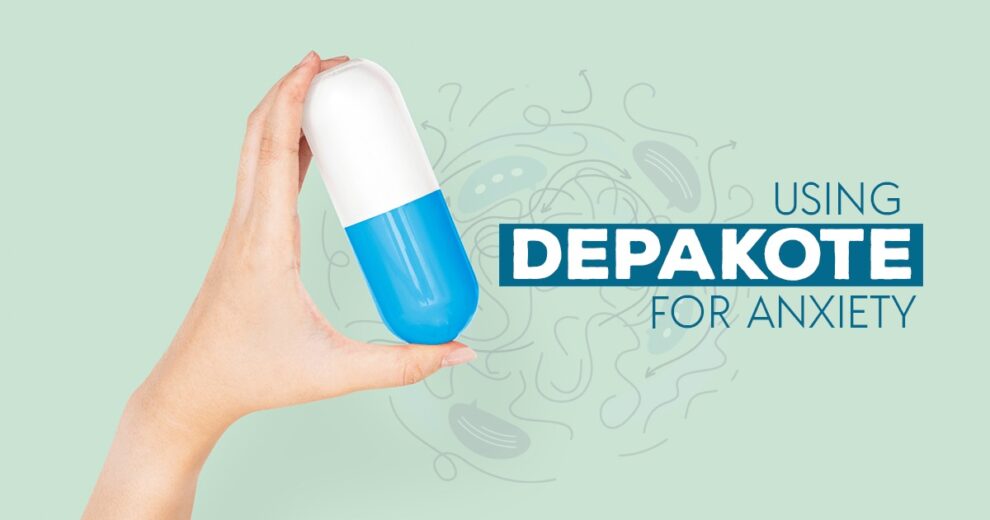Managing anxiety is a challenge in itself. For some people, therapy, lifestyle adjustments, and standard medication can help. Worrying, racing thoughts, and physical tension can still make day-to-day life a struggle. For some people, calming those thoughts is much harder than it should be. In those situations, Depakote for anxiety is brought up. Healthcare professionals have started considering it as part of an anxiety treatment plan, even though it was previously approved for epilepsy and mood disorders.
In this blog, we will cover the following: what is Depakote, how does it work, how effective is it for anxiety, and, most importantly, what you should know before considering it.
Understanding Depakote
Depakote, the brand name for divalproex sodium, is a medication primarily used to treat seizure disorders, bipolar disorder, and migraines. Its method of action includes the stabilization of electrical activity in the brain while balancing major neurotransmitters. Its use for anxiety is not formally endorsed as the FDA does not approve it, but many psychiatrists do use it “off-label” for symptom management. This is especially true for those patients with co-occurring mood or seizure disorders.
Why is Depakote Considered for Anxiety
Anxiety typically arises due to overactive neural circuits and some imbalance in neurotransmitters and/ or hormones. Depakote is a possible candidate for patients whose anxiety is treatment-resistant due to its ability to calm excessive activity. For those who have not responded positively to SSRIs or benzodiazepines as the first-line treatment, Depakote is a candidate.
Doctors may recommend Depakote when:
- There is anxiety along with bipolar disorder or seizure disorders.
- Previous treatments have failed.
- There is moodiness or anger that may be related to anxiety.
How Depakote Works in the Brain
Understanding anxiety management is easier when we understand how Depakote affects the brain:
- GABA Boost: Depakote augments gamma-aminobutyric acid (GABA), which is a calming neurotransmitter.
- Mood Stabilization: It helps with the reduction of mood swings and agitation by regulating neurotransmitter activity.
- Electrical Balance: It stabilizes overactive neurons that may be associated with anxiety disorders.
These mechanisms justify the use of Depakote in complicated anxiety cases, particularly where other medications have failed.
Effectiveness of Depakote for Anxiety
While clinical studies on the use of Depakote for anxiety are lacking, preliminary research and patient testimonials are encouraging. Many patients report less intense panic attacks, less intrusive worrying, and overall improved emotional control.
That being said, effectiveness is still highly correlated to a patient’s diagnosis, the medication dosage, and the presence of other therapies such as counseling or CBT.
Dosage and Administration
The forms of Depakote include tablets, delayed-release tablets, and liquid solutions. Like most medications, doctors start with a low dose and adjust based on response and tolerance.
Commonly, the processes include:
- Initial Assessment: Evaluation to ensure Depakote is appropriate.
- Low Dose Start: Small dose to monitor side effects.
- Gradual Adjustment: Slowly increasing until optimal relief is achieved.
- Regular Monitoring: Liver function and Depakote levels, blood tests.
Remember, it is essential to consult with your doctor before changing your dose.
Benefits of Using Depakote for Anxiety
With the appropriate prescription, Depakote offers several benefits, such as:
- Reduced intensity and frequency of anxiety symptoms
- Enhanced mood stability and diminished emotional outbursts
- Improved sleep and diminished racing thoughts
- Relief of co-occurring conditions such as migraines or seizures
The benefits listed can be life-changing for patients struggling with severe or treatment-resistant anxiety.
Possible Side Effects
Just like every medication, Depakote has its potential risks. Some common side effects include:
- Nausea and stomachache
- Dizziness and sleepiness
- Increase in weight
- Thinning of hair
Although changes in liver function, pancreatitis, and some changes in blood cells are serious but rare side effects, regular lab work is important in detecting any issues early.
Who Should Avoid Depakote
Not everyone can take Depakote. It is commonly avoided in:
- Pregnant women because of the potential for significant congenital disabilities.
- People with liver disease and significant liver function changes.
- People with a history of pancreatitis.
To ensure safety with Depakote, make sure to provide your complete medical history to the prescriber.
Combining Depakote with Other Treatments
Depakote can be integrated with other strategies to manage anxiety. These are:
- Therapy: One of the most impactful strategies to manage anxiety. It is cognitive behavioral therapy.
- Therapy: Regular exercise, healthy eating, and practicing mindfulness improve overall wellness.
- Other Medications: There are instances when Depakote is used in combination with buspirone and SSRIs for greater impact.
What to Discuss with Your Doctor
Before starting Depakote for anxiety, discuss it fully with your healthcare provider. Your healthcare provider must know the following:
- Your complete medical and medication history
- Any past negative responses to mood stabilizers
- Your daily habits
- The possibility of routine lab tests.
Addressing these points ensures a safer and more tailored treatment.
Realistic Expectations with Depakote
Many patients tend to set unrealistic goals, especially during the first two weeks of starting a medication. Man patients reported an improvement in their symptoms within the first month, while some patients didn’t see any improvement for a while. Managing anxiety while balancing the need to calm side effects requires a dose of patience, an expectation of anxiety, and a willingness to withstand some temporary discomfort.
The Importance of Monitoring
Prescribing Depakote requires careful medical oversight. Your doctor might need to perform the following:
- Liver Function Tests: Monitor the early stages of liver damage.
- Depakote Level Tests: Verify the medication dose is within the therapeutic range.
- Blood Panels: Check for platelets and white blood cells.
Failure to consistently partake in these tests increases the risk of serious medication side effects and ensures that the medication remains safe over time.
Alternatives to Depakote
If Depakote is not suitable, there are other alternatives, including:
- SSRIs or SNRIs: Often used as a first-line treatment for anxiety.
- Buspirone: A non-addictive medication used for Generalized Anxiety Disorder.
- Beta-Blockers: Helpful for performance or situational anxiety.
- Therapy-Only Approaches: These are more effective when combined with lifestyle changes.
Talking to your provider about other alternatives assures you will receive care that best matches your health needs and personal preferences.
Living with Anxiety: A Holistic Approach
While medications such as Depakote may help, they should not be the only focus in the management of anxiety. A combination of therapy, self-care, and social support strengthens a person’s foundation for recovery.
- Therapy: Addresses the thought processes that contribute to anxiety.
- Mindfulness and Relaxation Exercises: Mental exercises such as breathing, meditation, and yoga.
- Routine: Improved sleep, nutrition, and exercise outcomes increase life quality.
Key Takeaways
- Depakote is primarily a seizure and mood stabilizer, but can be used off-label for anxiety.
- It works by stabilizing brain chemicals and calming overactive neurons.
- It’s particularly helpful in cases of treatment-resistant anxiety or when co-occurring conditions exist.
- Close monitoring is vital to ensure safety and effectiveness.
Closing Considerations
The choice of trying Depakote for anxiety is something that requires the input of mental health professionals. Although not a one-size-fits-all solution, this medication has been beneficial for some patients with anxiety that was not fully managed by other treatments.
If you are looking for medication or guidance, consider consulting a few professionals. Hillside Horizon has a caring and dedicated staff that will navigate you through a working, safe, and evidence-based treatment plan tailored for you.




